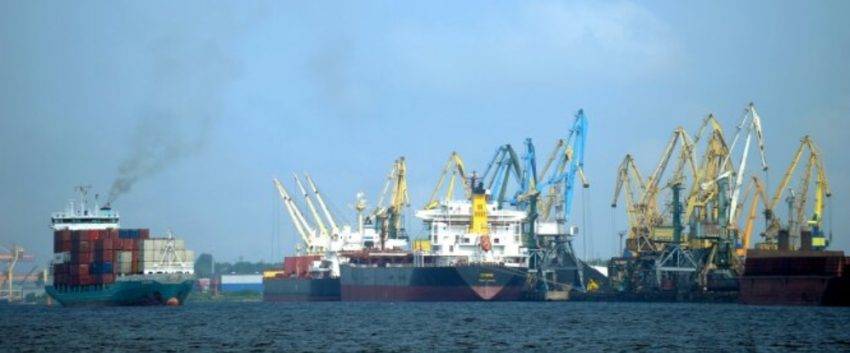Since the beginning of March in the Gulf of Riga at the anchorage of the Freeport of Riga, a ship with 55,000 tons of potassium chloride on board has been in the roadstead, according to the Latvian television de facto program.
This cargo of mineral fertilizers belongs to a company subject to EU sanctions imposed on Russia. Unlike other mineral fertilizers that fell under sanctions and which began to be exported after the decision of the State Environment Service, in this case the service does not plan to act in this way.
At the beginning of summer, the ship’s crew asked for help: they ran out of fuel, drinking water, and accumulated waste. The cargo ship does not go to sea, but it cannot return to the port either – the cargo of potassium chloride belongs to a company that is under sanctions imposed against Russian businessman Dmitry Mazepin. And for several months, various institutions have not been able to find a way out of this situation.
About a week after Russia’s invasion of Ukraine, a partially loaded Asian Majesty arrived at the port of Riga from St. Petersburg. Potassium chloride was loaded onto the ship at the Riga fertilizer terminal. Since March 5, a ship with a cargo of almost 55,000 tons of mineral fertilizers has been anchored in the Gulf of Riga.
On March 9, the European Union imposed sanctions against Dmitry Mazepin, close to the Kremlin, who controls the mentioned terminal, as well as United Fertilizers Comapany Limited, registered in Mauritius, which owns the cargo on the ship. The declared value of the cargo is about 17 million US dollars.
Asian Majesty asked for permission to leave the port of Riga in May this year. But the Latvian customs refuses to release the vessel.
“The ship as such is not sanctioned, but the owner of the cargo is under sanctions. It is on this basis that the customs service, in fulfilling its duties, does not allow the export of this cargo,” explains Raimonds Zukuls, managing director of customs at the State Revenue Service.
The vessel is owned by a company registered in Singapore, and sanctions are not applied to the vessel itself and its crew. It could leave the territory of Latvia if it did not carry a specific cargo, which is considered a frozen economic resource.
The State Environment Service said that its responsibilities include checking marine fuel: the Baltic Sea has strict requirements for the quality of marine fuel in terms of sulfur content. The service emphasizes that burning fuel oil is harmful to the environment, so the ship should go to sea as soon as possible.
By mid-summer, the Asian Majesty’s supply issues were resolved, but not with a cargo of mineral fertilizers. Unlike other cases, this cargo is waiting for a buyer who is not related to the sanctions. And when selling the cargo, the funds received must in any case be frozen – in order to comply with the purpose of the sanctions.
“And unlike other cases, this is not a situation where the cargo is delivered to some buyer, and the amount received is credited to an account that is frozen. In this case, based on the information we have, the cargo will simply end up on the territory belonging to another sanctioned person or in another place at his disposal.In other words, one must be very careful to make sure that there is a reason for the release of the vessel, whether exceptions can be found in EU legal acts.Exception narrow – environmental safety, safety people. The question is whether any of this applies to our case,” explains the head of the Legal Department of the Ministry of Foreign Affairs, Kristine Lice.
When, after the imposition of sanctions, it was decided what to do with dangerous ammonia in Ventspils or mineral fertilizers (including ammonium nitrate) in the port of Riga, the State Environmental Service allowed them to be disposed of without violating the sanctions regime, arguing its decision with a potential danger to the environment. But now the service does not plan anything like that.
“Of course, the presence of a ship in the roadstead worsens the state of the environment, but there is no danger to it. Therefore, society probably should not have a reason to worry, and the service does not do this either,” explains the position of the service, its head Baklane Ansberga.
Now five institutions are working on what to do with the “Asian Majesty” cargo – the Ministry of Foreign Affairs, the State Environmental Service, the Financial and Capital Market Commission, the State Revenue Service and the Freeport of Riga Authority. But there are no specific scenarios and forecasts yet.
Customs offered to unload the cargo at one of the warehouses in the European Union. But the Riga Trade Terminal technically cannot accept the cargo back, since its equipment is only designed for loading ships, and not for unloading ashore.
The case with “Asian Majesty” is one of the most difficult ones that are currently being resolved in Latvia under the sanctions. Neither the vessel nor the cargo belongs to companies registered in Latvia. For them, there are no bank accounts here and they are not aimed at cooperation.
A simple ship could already cost several million dollars. The shipowner appealed to the State Revenue Service with a complaint, asking for a solution.
“An additional complication is created by the fact that communication with shipowners is very difficult. The owners are not persons under the jurisdiction of Latvia. So far there is no information from customs colleagues that the cargo can be unloaded at any port of the European Union, where it is technically possible. Then the cargo will be frozen, and the ship will be able to leave,” says Kristine Lice.
But even without this cargo, a lot of mineral fertilizers remain in the territory of the ports in Riga and Ventspils, owned by companies registered in Latvia and under EU sanctions. Thus, more than 52 thousand tons of potassium chloride salts and about three thousand tons of surplus liquefied ammonia are still in the port of Ventspils, which are planned to be exported by tankers. And in the Riga Commercial Port – about 120 thousand tons of various mineral fertilizers.
Previously, it was expected that all dangerous goods should leave Latvian ports at the end of August, reminds the transfer.


